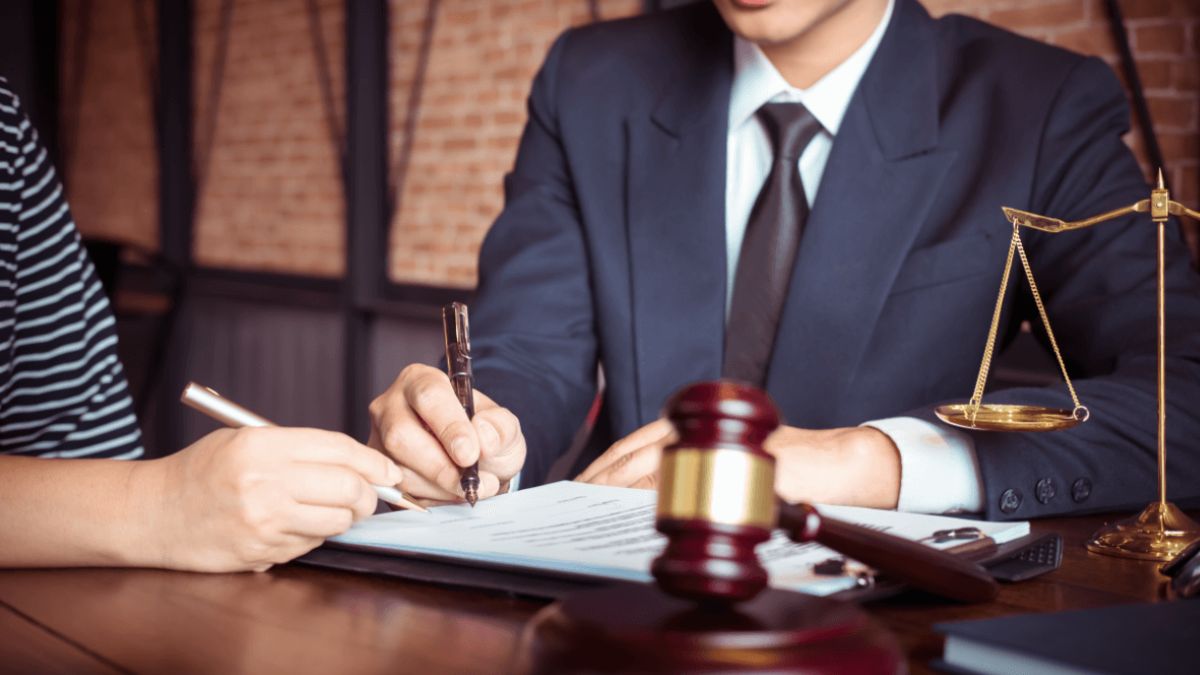LAW
Eight Incontestable Reasons You Need a Car Accident Lawyer

Car accidents and speeding are a serious threat in today’s age of increased traffic, and being involved in an accident can be a traumatic experience, leaving victims overwhelmed by physical injuries, emotional stress, and financial burdens.
Whether you’ve been in a car accident yourself or are supporting a friend or family member in such a situation, it’s important to ensure that the help necessary for recovery is provided. One of the most critical steps in this process is choosing a qualified car accident lawyer who can advocate for you during this challenging time.
A lawyer with expertise in car accident cases can protect your rights, handle complex legal issues, and work to secure fair compensation for the losses. The following are eight Incontestable reasons why hiring a car accident lawyer is important when dealing with a traumatic event such as a car accident.
1. Navigating the Legal Maze
Car accident attorneys have a deep understanding of the law and how it applies to a specific situation. With their knowledge and expertise, they can help move your case forward more smoothly and efficiently than you can if you had tried handling it on your own.
Determining who’s responsible in a car accident can be complicated, as several parties may
share liability depending on the circumstances. For example, the driver of the at-fault vehicle might be responsible, or even a third-party driver involved in the accident can be held liable.
In some cases, a government entity could also share the blame if a road defect played a part, or a product manufacturer might be liable if a faulty car part caused the accident.
An experienced attorney will help you explore these potential sources of compensation, including options you may not have even thought of.
2. Helping You Find Medical Resources
Car accidents often involve a lot of injuries and expensive treatments, and often, you struggle to find the right medical care for your injuries. Your attorney can be a valuable resource beyond just legal advice.
Lawyers have various connections across the field, including healthcare; they might link you with trusted medical professionals. Your attorney knows which caregiver is experienced in dealing with injury claims.
This can be critical because some health care medics specialize in documenting injuries accurately, which will strengthen your case later on. With your lawyer’s help, you get not only immediate access to care but also the right kind of care, reducing the risks of prolonged pain or complications.
Car accident lawyers also negotiate on your behalf to arrange medical treatment under a lien, meaning you won’t have to pay for those expensive medical treatments yourself. Instead, payments can be deferred until your case is resolved, making it easier for you to focus on recovery.
Lawyers handling car accidents nationwide often coordinate with case managers, physical therapists, and even mental health professionals if your injury requires it. They understand that injury cases are about your overall recovery, and that means supporting your medical, physical, and emotional well-being every step of the way.
3. Alleviating Stress
Car accidents can be extremely traumatic. When you’re dealing with injuries, stressing about not being able to work, and worrying about your increasing medical bills, dealing with legal issues can push you over the edge.
In such scenarios, an experienced representation after a car crash can help you a lot. Experienced lawyers can take a little bit of weight off your shoulders, allowing you to focus on healing. Dealing with the complexities of insurance companies, collecting evidence, and understanding legal processes is overwhelming.
This stress can affect your sleep, heighten emotional distress, and make it easy to neglect your self-care. By hiring a car accident lawyer, you can hand over this responsibility to someone knowledgeable. This not only helps reduce your stress levels but also brings you greater peace of mind.
4. Going for Litigation
In case the situation exceeds and there’s a chance your case might go to court, having a lawyer with significant trial experience can help you through this process. They understand the courtroom procedures and can effectively help you in arguing your case.
Your lawyer will guide you through the process, prepare you for what to expect, and handle the legal complexities. With their support, you can feel more confident knowing that an experienced advocate is fighting for your rights and interests.
5. Guaranteeing Payment Only Upon Victory
In injury cases, it’s common for attorneys to work on a contingency basis. A contingency fee means your lawyer won’t charge you upfront and will only collect payment if they help you win your case in court and successfully secure compensation for you.
Often, their fees come out of the total compensation amount. This way, you won’t have to worry about a mountain of medical bills along with legal fees. This policy is used by the majority of lawyers.
6. Avoiding Costly Mistakes
Car accident law is a complex area of law, and there are many nuances and pitfalls that the average person may not be aware of. In that case, self-representation often leads to costly mistakes.
Many people unknowingly accept quick settlements because they’re ignorant of the true value of their claim, say things that can hurt their case, or miss crucial deadlines. They can fail to gather evidence or make procedural errors.
A car accident attorney can help you steer clear of these pitfalls and ensure your rights are protected throughout the legal process.
7. Navigating Through Accidents That Occur Abroad
Car accident lawyers help you not only in incidents that occur in your home country but also in those that happen abroad. They possess the expertise to understand the complexities of international laws and help you understand your rights in a foreign legal system.
Whether it’s handling language barriers or negotiating with local insurance companies, they can effortlessly help you with the challenges of each situation, no matter where the accident occurred.
8. Saving you time and effort
If you’re self-representing, it will take you ages to understand the important nuances of dealing with a car accident. Whereas, an experienced lawyer already has the knowledge necessary to deal with the claims process, saving you the time you would have spent acquiring it.
This will save you time and effort to focus on recovery and other aspects of your daily life.
LAW
Family Law Basics: Key Issues and Solutions

Family law touches nearly every aspect of our most personal relationships, including marriage, separation, child custody, and financial arrangements after a separation. Understanding the foundations of family law can make navigating these highly emotional and complex issues less overwhelming and far more manageable. Many individuals facing family legal challenges turn to a family attorney Tampa for experienced legal support and guidance, especially when outcomes can significantly impact their families’ futures.
From creating legal unions to resolving child custody disputes, family law is designed to both protect and provide clarity for all parties involved. Whether you are preparing for marriage, facing divorce, or seeking a protective order, having a clear understanding of your rights and obligations is crucial. This knowledge not only empowers you to make informed decisions but also helps ensure that your family’s well-being remains the top priority in any legal process. With laws and regulations differing from state to state, staying informed and seeking timely legal counsel is often a wise first step.
Marriage and Legal Unions
Getting married is not only a significant emotional milestone, but it also constitutes a legal contract between two individuals. Family law regulates the process of legal unions, setting the requirements for age, consent, and state-specific documentation. Once married, both partners acquire certain legal rights and responsibilities, encompassing joint property rights, financial duties, healthcare decisions, and inheritance arrangements. These legal dimensions make marriage more than a personal promise; it’s a legal status that carries essential consequences.
Understanding the legal prerequisites for marriage, such as blood tests (in some states), license applications, and waiting periods, can be essential for couples planning to wed. Entering marriage with a solid knowledge of these requirements helps lay a strong legal and relational foundation.
Divorce and Legal Separation
Divorce marks the legal end of a marriage and can be a complex process involving emotional, financial, and logistical hurdles. States generally recognize two main approaches: no-fault divorce, which doesn’t require proof of wrongdoing, and fault-based divorce, which requires grounds such as abuse or infidelity. Divorce settlements typically encompass asset division, debt allocation, child custody arrangements, and ongoing support agreements.
Legal separation, an alternative for couples not ready for divorce, allows for the division of property and parental responsibilities while the marriage remains legally intact. This can provide a middle ground for couples grappling with reconciliation or religious reasons for avoiding divorce.
Child Custody and Visitation
When children are involved, custody arrangements become a critical aspect of family law. Courts make custody and visitation decisions with the child’s best interests in mind, considering factors like each parent’s stability, parenting ability, and the wishes of older children. There are several types of custody—legal, physical, joint, or sole—depending on the circumstances.
Visitation rights ensure that both parents can continue to be involved in their child’s life. Modern courts increasingly value maintaining meaningful relationships with both parents unless doing so would endanger the child’s safety or well-being.
Child Support and Alimony
Ensuring children have access to the resources they need is at the heart of child support law. Child support payments are designed to cover basic needs, such as housing, food, and healthcare, and may also include expenses for education and extracurricular activities. The calculation of support obligations typically considers parental income, custody arrangements, and the child’s specific needs.
FindLaw’s guide to child support provides a detailed overview of the process, including calculation methods and enforcement procedures.
Alimony, also known as spousal support, may be awarded when one spouse requires assistance in becoming financially independent after divorce. Courts weigh factors such as the length of marriage, earning potential, and each party’s contributions when determining if and how much alimony is paid.
Property Division
In a divorce, marital property (assets accumulated during the marriage) must be divided. Most states follow the principle of “equitable distribution,” aiming for a fair—though not necessarily equal—split based on the partnership and individual needs. Factors considered may include the duration of the marriage, both spouses’ contributions, and future financial prospects.
Debts incurred during the marriage—like mortgages or loans—are divided alongside assets. Understanding what qualifies as marital vs. separate property can help prevent conflicts during the legal process.
Adoption and Guardianship
Adoption provides a legal framework for individuals to become the lawful parents of a child who isn’t biologically theirs. The process is thorough, including background checks, home studies, and court hearings to ensure the child’s welfare. Adoption can be domestic, international, or through foster care systems.
Guardianship provides an alternative legal arrangement, enabling individuals to care for a child without relinquishing parental rights. It’s often used in cases where parents are unable to care for their child temporarily but wish to maintain their legal relationship.
Domestic Violence and Protective Orders
Protecting family members from harm is a vital function of family law. Victims of domestic violence can seek protective (or restraining) orders, which legally prevent abusers from contacting or approaching the victim. Courts act quickly to ensure safety, sometimes issuing immediate orders before a full hearing has taken place.
Support organizations and the National Domestic Violence Hotline provide essential resources and safety planning for individuals in abusive situations. Legal tools and community resources together play a crucial part in preventing harm and facilitating recovery.
Prenuptial and Postnuptial Agreements
Prenuptial and postnuptial agreements outline how future disputes over property and debts should be resolved in the event of divorce or death. These legally binding documents clarify expectations, prevent misunderstandings, and protect assets such as family businesses, inheritances, or premarital property.
While discussing such agreements can be sensitive, they often help foster transparency and trust by addressing financial matters before potential issues arise.
Family law encompasses a wide range of deeply personal issues, but receiving timely and knowledgeable legal guidance can provide clarity and peace of mind. By educating yourself about your rights and obligations, and considering experienced legal help when necessary, you can ensure that your interests and your family’s well-being are protected throughout every step of the process.
LAW
Defense Attorney Near Me

You may find yourself searching for a defense attorney near me during times of stress or uncertainty. When facing legal challenges, having the right defense attorney by your side is crucial. They stand as your guide, offering strong support and clear advice. This decision is not just about location. It’s about choosing someone who listens, understands, and fights for you. A nearby defense attorney often offers more than convenience. They can provide local insight and quick response times. You deserve to feel confident and secure knowing you have a dedicated professional in your corner. You want someone who understands the weight of your situation and is ready to take immediate action. Navigating the legal world can be overwhelming, but with a trusted defense attorney nearby, you are not alone. They will walk with you, ensuring that your rights are protected and your voice is heard.
Understanding the Role of a Defense Attorney
A defense attorney is your legal protector. They represent you in criminal cases, working tirelessly to ensure your side of the story is heard. Their responsibilities include gathering evidence, interviewing witnesses, and crafting a strong legal strategy. This role demands not only legal skills but also empathy and dedication. Your attorney serves as both an advocate and a counselor, guiding you through complex legal processes. According to the United States Courts, understanding your rights and the intricacies of the legal system can significantly impact the outcome of your case. By selecting an attorney who is both skilled and compassionate, you set the stage for the best possible defense. For more detailed information on criminal laws and penalties, visit the Law Office of Michael Stefanos.
Why Local Matters
Choosing a “defense attorney near me” is more than a matter of convenience. Local attorneys bring an understanding of regional laws and court systems, which can be invaluable. They often have established relationships within local legal circles, which can facilitate more effective communication and negotiation. Being nearby allows them to dedicate more time to your case, offering the advantage of immediacy in actions and decisions. Furthermore, their proximity often translates to better availability for meetings and court appearances. This local advantage can be crucial in developing a tailored defense strategy that considers all aspects of your case.
Factors to Consider When Choosing a Defense Attorney
When selecting a defense attorney, consider these key factors:
- Experience: Look for an attorney with a proven track record in similar cases.
- Communication: Ensure they communicate clearly and are available to answer your questions.
- Reputation: Research online reviews and seek recommendations from trusted sources.
Choosing the right attorney can profoundly affect your case’s outcome. For help with finding a lawyer, you might consult resources like the American Bar Association.
Potential Costs Involved
Understanding the potential costs involved in hiring a defense attorney is essential. Legal fees can vary widely based on experience, case complexity, and location. Here’s a simple comparison to help you understand general expectations:
| Service | Average Cost |
|---|---|
| Initial Consultation | Free to $300 |
| Hourly Rate | $150 to $700 |
| Flat Fee for Misdemeanor | $1,000 to $3,000 |
| Flat Fee for Felony | $3,000 to $10,000+ |
Discuss cost structures with potential attorneys upfront. Ask about any additional fees and understand what services are included.
The Importance of Trust
Trust is the foundation of any attorney-client relationship. You should feel comfortable sharing sensitive information with your attorney. If you feel unsure or uneasy, it may be wise to continue your search. An attorney who listens and responds with understanding helps build the trust necessary for a collaborative relationship. This trust will be crucial as you work together to build a defense that aligns with your needs and expectations.
Final Thoughts
Facing legal challenges is never easy. However, with a “defense attorney near me,” you gain a partner who understands the legal landscape and is committed to your defense. Whether you’re navigating a minor issue or a more serious charge, the right attorney provides the guidance and support you need. Take the time to research and choose someone who aligns with your values and needs. Doing so can significantly influence the journey ahead, offering peace of mind and a positive impact on your case’s outcome.
LAW
What To Do If Your Ex Stops Paying Court Ordered Support

Dealing with the sudden halt of court-ordered support can shake your stability. Whether it’s child support or spousal maintenance, you’re left wondering how to manage. Immediate action is needed to address this issue. You are not alone in facing this challenge. Many encounter this roadblock, and there are clear steps to follow. First, understand the factors that influence support payments. You may ask, “What is alimony?” Alimony is financial support from one ex-spouse to another post-divorce. It ensures financial fairness and continuity. When these payments stop, it disrupts your planned financial security. Start by reviewing your court order. Check the specifics of the payment terms. Confirm whether the non-payment was accidental or intentional. If intentional, the next step is to contact the legal system. Your local courthouse or legal aid organization can guide you. Remember, time is critical. Addressing the situation swiftly helps secure your financial future.
Steps to Take
When your ex stops paying, follow these steps. First, examine the court order. This order lists the payment amount and schedule. Make sure you know these details. If there is a misunderstanding, clarify it with your ex. Communication might solve the issue quickly.
Next, gather evidence of missed payments. Collect bank statements or payment records. These documents are crucial if you need to take legal action. Then, contact a legal professional or family law advisor. They can offer guidance. Legal aid offices often provide assistance at low or no cost. Access more information about legal aid through Legal Services Corporation.
Contact the Court
If payments do not resume, you may need court intervention. File a complaint about non-payment. The court can enforce the original order. Possible actions include wage garnishment or contempt of court charges. The court’s involvement signals seriousness and often prompts payment. Understand that court procedures can vary by location. Ensure you follow the correct process by consulting your courthouse.
Options for Support Enforcement
Various enforcement options exist. Wage garnishment involves automatically deducting payments from wages. Seizing tax refunds is another possibility. The court might also impose fines or suspend licenses. These measures encourage compliance with orders.
Comparison of Enforcement Options
| Enforcement Option | Action Taken | Effectiveness |
|---|---|---|
| Wage Garnishment | Directly deducts payment from wages | Highly effective |
| Seizing Tax Refunds | Redirects tax refunds | Effective |
| Suspending Licenses | Revokes driving or professional licenses | Moderately effective |
| Fines and Penalties | Imposes additional financial penalties | Moderately effective |
Seek Mediation
Mediation might be a viable option. It offers a neutral ground for discussion. Mediators help each party reach an agreement. This path often resolves conflicts without court involvement. Resources for mediation can be found at local family courts or community centers.
Consider Long-term Solutions
Think about the long-term financial impact. Adjust your budget to account for missed support. Explore financial planning resources. Consider job training or education programs to increase earnings. Your stability is a priority.
Conclusion
When your ex stops paying court-ordered support, it creates stress. Yet, you have options to regain control. Start with understanding, communication, and documentation. Then, move to legal avenues if necessary. Consider mediation for peaceful resolution. Finally, secure your financial future by planning for changes. Take these steps to empower yourself and ensure your family’s wellbeing.
-

 FASHION12 months ago
FASHION12 months agoTop Kids Clothing Trends for 2025 – What’s In Style This Year?
-

 FASHION1 year ago
FASHION1 year agoElegant Winter Party Style: Trendy Long-Sleeve Dresses and Essential Hair Care Tips
-

 HOME12 months ago
HOME12 months agoWeather Related Event Closings Explained
-

 AUTOMOTIVE1 year ago
AUTOMOTIVE1 year agoMitsubishi Pajero 3.0 V6 – Specs, Performance & Guide
-

 HOME1 year ago
HOME1 year agoExploring the World of TG Tube: A Comprehensive Guide
-

 BUSINESS1 year ago
BUSINESS1 year agoHOW TO SHOP GOODWILL OUTLET STORE
-

 HOME12 months ago
HOME12 months agoTributePrintedPics Review: A Deep Dive into Quality, Design, and Customer Experience
-

 EDUCATION12 months ago
EDUCATION12 months agoCan You Wear a Different Coloured Contact Lens in Each Eye? The Science Behind Mismatched Vision
